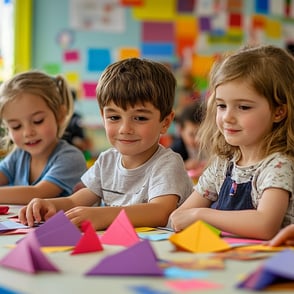The Power of Card Games: Fostering Cognitive Flexibility and More in Children
In an age where digital screens dominate, parents and educators are constantly on the lookout for engaging, educational activities that can effectively compete with the instant gratification of a tablet or smartphone. Enter the humble card game—a timeless classic that might just be the solution. While card games may seem simple on the surface, they offer layers of educational benefits that can support a child's growth in cognitive flexibility, responsiveness, hand-eye coordination, and numeracy. In this blog, we delve into the inherent values of card games and highlight research underscoring their role in neurological development.
Before you go further, why not check out some of our other blogs on fun, engaging and educational family games?
And do check out the articles in Today's Parent and the Independent on some further card games to play...
Cognitive Flexibility: The Mental Gymnastics of Card Games
Cognitive flexibility is the ability to adapt one's thinking in response to changing goals or environmental stimuli. In simpler terms, it’s the mental agility we use to switch gears when circumstances change. Research suggests that card games can significantly enhance this skill in young children. A 2018 study published in the journal Cognitive Development found that playing card games like "Uno" or "Go Fish" helps preschoolers improve their ability to shift focus and adapt to new rules.
Card games naturally require players to adjust strategies, remember rules, and anticipate opponents' moves, which in turn exercises their cognitive flexibility. For instance, in games like "Crazy Eights," children must constantly adapt to new rules based on the card played, keeping them on their toes and forcing them to think ahead.
Responsiveness: Quick Thinking in a Playful Setting
Responsiveness, or the ability to react swiftly and appropriately to stimuli, is another crucial skill honed through card games. Fast-paced games like "Snap" or "Slapjack" teach children to pay attention and respond quickly. This not only sharpens their reflexes but also fosters attentiveness and concentration.
A study in the Journal of Experimental Child Psychology observed that regular participation in card games improved the speed and accuracy of responses in children aged 3 to 5. The tactile and visual nature of card games, which requires children to respond to visual cues and physical actions, offers a well-rounded workout for the developing brain.
Hand-Eye Coordination: Precision in Play
While digital games also demand a degree of hand-eye coordination, the physicality of card games introduces a different level of engagement. Handling cards, shuffling, dealing, and placing them on a surface all enhance fine motor skills. A study in the American Journal of Occupational Therapy highlighted that activities involving small, precise movements—like those in card games—are essential in developing hand-eye coordination in preschoolers.
Games like "Memory" encourage children to flip and match cards, which requires careful control and coordination. Such games can be particularly beneficial for younger children still refining their motor skills and dexterity.
Numeracy: Stealth Math Practice
Numeracy, the ability to understand and work with numbers, can be subtly woven into the fabric of card games, making learning numbers both fun and incidental. Games like "War" or "Crazy Eights" introduce children to basic arithmetic concepts such as counting, sequencing, and comparing numbers in an enjoyable context.
A 2020 study in Early Childhood Education Quarterly found that children who engaged in card games regularly showed marked improvements in their numeracy skills compared to those who did not. Incorporating numbers into play allows children to internalise mathematical concepts more naturally and without the pressure often associated with formal learning environments.
Moving Beyond the Screen: The Benefits of Tangible Play
While digital games boast vibrant graphics and interactive features, they often lack the tangible interaction that card games offer. Physical play is crucial in the early years of development, as it engages multiple senses and provides a more comprehensive learning experience. Card games encourage social interaction, which is vital for developing communication skills and emotional intelligence.
Moreover, taking a break from screens can relieve the strain on young eyes and prevent the digital fatigue that’s becoming increasingly common among children. Playing card games at a table or on a blanket in the park also offers a change of scenery, fostering creativity and imagination.
Making Card Games Part of Your Child’s Routine
Incorporating card games into daily routines can be both simple and rewarding. Setting aside dedicated family game nights, perhaps once a week, can become a cherished tradition. Encourage children to invite friends over for card game afternoons, providing a social element that enhances the learning experience. The key is to keep the environment fun and pressure-free, allowing children to explore and experiment with the games.
Book in to see our beautiful kindergartens via the below buttons
Conclusion: A Balanced Play Diet
While technology undoubtedly offers valuable educational tools, it's crucial to balance digital interactions with hands-on, social activities like card games. These timeless games provide a rich tapestry of learning opportunities, from cognitive flexibility and responsiveness to hand-eye coordination and numeracy. By embracing card games, we offer children a well-rounded play experience that supports their development in a fun and engaging manner.
The next time you see a deck of cards, remember: you're not just holding a game; you're holding a passport to a world of learning and growth for your child. So why not shuffle the deck and deal out a hand of opportunity today?

07-Jan-2025 12:53:13







Write a Comment